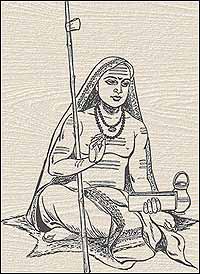|

|
Adi Shankara Vakya Vritti verses
- “If as said, the depth-meaning
of the term ‘that’ is ‘Mass-of Bliss, without-second’, and ‘thou’ is
the ‘Witnessing-Consciousness’, then what ? Listen: the Inner-self,
the Consciousness, that illumines all thoughts, remains as the
All-full, One-Mass-of Bliss, without-a-second.”
- “The great statements, like ‘That thou
art’, established the identity of what is meant by the two terms
‘thou’ and ‘That’ in their deeper indicative-meaning.”
- “How great statement discards the two
qualified-meanings, and reveals what it really means – this we have
carefully commented upon already.”
- ‘That which shines, as the object of the
idea and the word ‘I’, is Consciousness expressing in the inner
equipments. This is the direct word-meaning of ‘thou’ (twam).”
- “The Consciousness that is expressed
through Maya, which then becomes the ‘cause of the Universe’, which
is described as omnipresent, etc.; that which is known only
indirectly (meditate); and which is having the nature of existence,
etc., -- that Eswara is the word-meaning of the term ‘That’.”
- “In case we insist upon the identity of
‘that’ and ‘thou’ based upon the word-meaning of these terms, then
for one and the same factor we will have to attribute contrary
nature; the quality of being mediately and immediately known – and
also insist qualities of ‘existence of duality’ and also of
‘absolute oneness’, for one and the same factor. Identity between
such contrariness is impossible hence suggestive-meaning,
‘explanation by implication’ has to be accepted.”
- “If the direct word-meaning throws up an
inconsistency with what is pointed out by other proofs and
evidences, the sense consistent with its word-meaning that is
intelligently suggested by the term, is to be accepted – and this is
its suggestive-meaning (lakshana).”
- “In the statements like ‘that thou art’
etc., the reject-accept method is to be employed as in the sentence
‘He is this man’. No other method can be applied.”
- “Until the direct personal experience of
‘I am Brahman’ is gained, we must live values of self-control, etc.,
and practice listening to teachers, or reading scriptures, and doing
daily reflection and meditation upon those ideas.”
- “Through the grace of a spiritual teacher
when a seeker gains a clear and direct experience of the Supreme
Self as expounded in the scriptures, he, the realised, becomes free
from all ‘ignorance’, which is the foundation for the entire
experience of this world of plurality.”
- “No more conditioned by his gross and
subtle bodies, free from the embrace of the gross and subtle
elements, released from the charm of actions, such a man gets
immediately liberated.”
- “The liberated-in-life, due to the
compelling force of those actions that have begun to produce their
results (Prarabdha), remains for some time to exhaust them”.
- “The liberated-in-life comes to gain the
State of Absolute Oneness, the never-ending immeasurable Bliss,
called the Supreme Abode-of-Vishnu, from wherein there is no
return.”
More Vakya Vritti Verses -
1-10,
11-20, 21-30,
31-40 ^Top
Back to Adi Shankara Teachings |

Subscribe
 Bookmark & Share
Bookmark & Share
|
